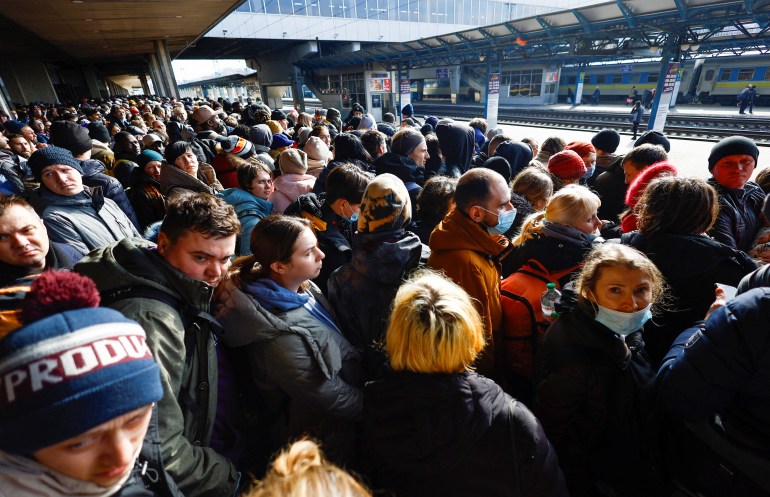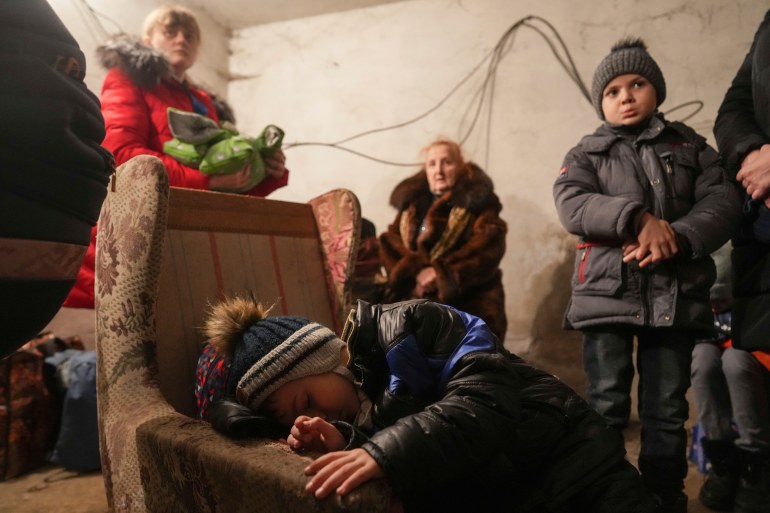Ukraine: ‘There were so many people willing to give blood today’
How Ukrainian citizens and the diaspora are rallying to help those on the front line – and each other.

As Ukraine faces the full force of a large-scale invasion by Russian troops, civilians and members of the Ukrainian diaspora worldwide are hastily setting up a number of initiatives to support soldiers and each other in this crucial moment.
The Ukrainian army, currently engaged in heavy fighting with the Russian military across the country, is a much better equipped and more professional force than in 2014, when a war against Russian-backed separatists began.
Keep reading
list of 4 itemsZelenskyy postpones foreign trips as 8,000 evacuated from Ukraine’s Kharkiv
‘Genuine desire’: Putin backs China peace plan to end Ukraine war
Russia-Ukraine war: List of key events, day 811
But with around 200,000 Russian troops and thousands of combat vehicles surrounding the country and a bloody invasion now under way, civilians are already taking it upon themselves to supply defence equipment, money and medical support to fellow Ukrainians.
Over the past two days, donations have flooded into organisations such as the Kyiv-based non-profit Come Back Alive. The organisation supplies Ukrainian military personnel with thermal imagers, night vision devices, mobile surveillance systems, unmanned aerial vehicles, mine clearance kits, and other high-precision equipment. According to the group’s Facebook page, they have raised $687,500 in one day.
The National Bank of Ukraine also set up a dedicated account on Thursday where people can donate money to support Ukrainian soldiers. The account is multi-currency, and its details have been widely circulated amongst Ukrainian diaspora communities.
In cities across Ukraine, civilians have also volunteered to give blood as the number of wounded soldiers increases. Maksym Khodushko, 42, a marketing manager from Kramatorsk, in the eastern Donetsk region, gave blood this morning. “There were so many people willing to give blood today that they are waiting their turn outside the hospital,” he said. “Giving blood is always important, and it’s even more important now when Russia is attacking.”

Evacuations to the west
In April 2014, the Ukrainian military was unprepared and underfunded when the war against Russian-backed separatists began. This resulted in some significant territorial losses in the Luhansk and Donetsk regions during the first few months of fighting.
It was only after thousands of volunteers joined the war in the east of the country that Ukrainian forces were able to push back the separatists, reclaiming several key territories – including the city of Kramatorsk – and forcing the Minsk ceasefire agreements.
But it was a shift only made possible by numerous crowdfunded campaigns organised via Facebook groups, websites, text messages and volunteer organisations that provided money and supplies to soldiers and volunteers on the front line.
Now, eight years later, people and organisations across the country are helping one another as soldiers and volunteers fight back on different fronts.
As the second day of fighting rages and more than 100 Ukrainians have been killed, Ukrzaliznytsia, the state railway company, vowed to help evacuate citizens from the most vulnerable locations. Today, railway workers continued to show up to work, with 80 percent of trains still operating in emergency mode. The passenger trains are forced to change routes and slow down near bomb shelters but will continue to shuttle people from the eastern parts into the west and central Ukraine.
On Thursday, it was announced by the Lviv State Regional Administration that two trains from the Luhansk region in the east would travel to the city of Lviv in western Ukraine. They will transport 41 children aged four and under, many orphans, and 18 children with disabilities and special needs. Another train will arrive from the Donetsk region carrying 106 children. The city of Lviv is considered a much safer part of the country – although shelling has been reported near the city – and has now become home to the remaining foreign diplomats.

Opening up homes
Ukrainians in the west have also begun to open up their homes to the thousands of people fleeing from the rest of the country. This morning Tanya Kapustinskaya, 26, who works for an NGO called the Centre of United Actions, woke up in western Ukraine after she only just managed to make it out of Kyiv with her colleagues before heavy shelling began to rain down on the city. The journey took around 18 hours, more than double what it would usually take, because of heavy traffic.
“Today, we woke up to more peaceful surroundings, but people still in Kyiv are being bombed; they need our help,” she says. So she and her colleagues decided to start a system this morning where residents in Lviv can fill out a Google form offering a space in their home to those looking to flee Kyiv and other areas. In addition, a separate Google form can be filled out by those looking to relocate to the safer west of the country. Just a few hours later, 70 people had already offered their homes.
In the hours after Russia began its full-scale invasion of Ukraine, fake reports, images and videos that claimed to show Russian fighter jets being shot down began to circulate on Facebook, Telegram and Twitter.
In response, organisations and individuals began to publish informational campaigns to raise awareness around Russian misinformation and show support for reputable Ukrainian news outlets still operating under the threat of bombing and cyberattacks. For example, an existing GoFundMe campaign supporting the Kyiv Independent, a Ukrainian online news website in English, raised nearly $300,000, more than three times its original $75,000 target, most of it after the invasion began.
Across the world, rallies have also been held in support of Ukraine in the face of Russian aggression. Thousands gathered in New York, London and Barcelona and other major cities yesterday to protest against the invasion of Ukraine.
Anna Kvachova, a Ukrainian based in London who attended the rally there, said, “It was scary to see how many other people are scared as well, but we are united, as usual, this is our strength but we are together no matter what happens”.
A petition demanding that the United Kingdom’s government pledge to defend Ukraine “up to and including full-scale military intervention if required” now has more than 11,000 signatures.
The chant of “no to war” rang out across major Russian cities yesterday as thousands of Russians gathered around the country to protest against their country’s further invasion of Ukraine. Russian police have arrested hundreds for taking part in these protests.